#The Hadith of Archangel Gabriel
Text
Named Angels
Fallen angels are not included. Neither are gnostic angels because I'm tired.
Aker: Named in the Greek Apocalypse of Ezra as one of the nine angels who will govern at the end of the world.
Al-Khidr: Also known as al-Khadir, Khader, Khidr, Hidr, Khizr, Kathir, Khazer, Khadr, Khedher, Khizir, Khizar, or Khilr. The Servant of God whom Moses accompanies in the Quran is identified as Al-Khidr by Islamic scholars.
Ambriel: Ambriel is an angel associated with the month of May.
Arariel: Described in the Talmud as the angel in charge of the waters of the Earth.
Ariel: An angel in Jewish and Christian mysticism. Ariel has dominion over beasts, creative forces, the North, and elemental spirits.
Arphugitonos: Named in the Greek Apocalypse of Ezra as one of the nine angels who will govern at the end of the world.
Artiya'il: An angel appearing in the hadith. Artiya'il removes grief and anxiety from humans.
Atid: One of two angels in Islamic tradition who records a person's actions. This record is used to confront each person on the Day of Judgment.
Azrael: The angel of death. Azrael is one of the four archangels in Islam.
Beburos: Named in the Greek Apocalypse of Ezra as one of the nine angels who will govern at the end of the world.
Camael: Also known as Chamuel, Khamuel, Camiel, Cameel and Camniel. One of the twelve Kabbalah angels, Camael is assigned to the fifth sephirah in the tree of life.
Cassiel: Also known as Qafsiel or Qaspiel. In Jewish and Christian mysticism, Cassiel is described by various roles, such as the angel of Saturn the angel of the moon, the angel of tears, and the angel of temperance. Cassiel is sometimes said to preside over the death of young men.
Dobiel: Also known as Dubbiel. Dobiel is the guardian angel of Ancient Persia.
Gabriel: An angel who announces God's will to men. Gabriel is considered in archangel in Jewish, Christian, and Islamic traditions. Gabriel appears to Daniel to explain his prophetic visions. Gabriel foretold the birth of John the Baptist to Zechariah and the Annunciation of Jesus to Mary. Gabriel appeared twice to Muhammad. In the church of Jesus Christ of Latter Day Saints, Gabriel lived a mortal life as the prophet Noah. Gabriel was named in the Greek Apocalypse of Ezra as one of the nine angels who will govern at the end of the world.
Gabuthelon: Named in the Greek Apocalypse of Ezra as one of the nine angels who will govern at the end of the world.
Haniel: Also known as Hananel, Anael, Hanael or Aniel. Haniel is sometimes listed as one of the seven archangels. In Kabbalah, Haniel is associated with the seventh sephirah.
Jegudiel: Also known as Iehudiel. Jegudiel is one of the seven archangels of the Eastern Orthodox Church tradition. Jegudiel is the patron saint of hard work and leadership and is often depicted holding a whip (as a punishment for sinners) and a crown (as a gift for the righteous).
Jerahmeel: Also known as Jeremiel, Eremiel, or Ieremihel. Jerahmeel is recognized as an archangel in Lutheran, Angelican, and Orthodox traditions. Jerahmeel is said to comfort the righteous dead in the Bosom of Abraham, or to guard heaven with St. Peter.
Jophiel: Also known as Dina, Iophiel, Iofiel, Jofiel, Yofiel, Youfiel, Zophiel, or Zuriel. In Anglican tradition, Jophiel is an archangel and in Kabbalah, Jophiel is associated with the sephirah chokmah. Some sources list Jophiel as the angel who guards the garden of Eden with a flaming sword.
Kalqa'il: Kalqa'il is an Islamic angel who guards the entrance of the fifth heaven.
Lailah: An angel appearing in the Talmud. Lailah is associated with conception, pregnancy, and the night.
Maalik: An Islamic angel of hell. Maalik carries out God's punishment on wrongdoers.
Metatron: Described in the Talmud as the heavenly scribe, Metatron is allowed to sit in the presence of God to record the deeds of Israel. Metatron was mistaken by Elisha ben Abuyah for a deity, and was subsequently lashed 60 times with a fiery rod to demonstrate that the Metatron was an angel and could be punished, unlike a god. In mystic writings, Metatron is the form Enoch took after his ascension. In Islam, Metatron is the angel of the veil and alone knows what lies beyond it.
Michael: Also known as Mika'il or Mikal. The prince of Israel and prince of the Heavenly Host. Michael is regarded as an archangel in Jewish, Christian, and Islamic tradition, and is the only angel explicitly identified as an archangel in the Christian Bible. In the book of Daniel, Michael fought the prince of Persia. In Revelation, Michael fought Satan and cast him out of heaven. Michael and Gabriel are the angels said to have shown Muhammad paradise and hell. In Jewish tradition, Michael prevented the sacrifice of Isaac by providing a ram. Seventh Day Adventists and Jehovah's Witnesses believe Michael is another name for Jesus in heaven. In the Church of Jesus Christ of Latter Day saints, Michael is the same person as Adam. Michael is named in the Greek Apocalypse of Ezra as one of the nine angels who will govern at the end of the world.
Moroni: In angel in the Church of Jesus Christ of Latter Day Saints. Moroni was the guardian of the golden plates from which Joseph Smith wrote the Book of Mormon, and appeared to Smith numerous times.
Muriel: Muriel is a Domination, a class of angel in the second angelic sphere. Muriel is associated with the month of June.
Nuriel: Regarded in some traditions as the same being as the angel Uriel. Nuriel is the angel of hailstorms and commands an army of 500,000 angels made of water and fire.
Pahaliah: Pahaliah is the angel of Redemption. Pahaliah is a throne, an class of angel in the first angelic sphere.
Puriel: Puriel accompanied Abraham on a journey to heaven. Puriel is tasked with examining the souls of those brought to heaven.
Raphael: Known in Islam as Israfel or Israfil. Raphael is regarded as an archangel in Jewish, Christian, and Islamic traditions. It is believed that Raphael is the angel in the Gospel of John who stirs the pool of Bethesda. In Islam, Raphael will blow the trumpet which signals the Day of Judgment, and the hadith lists him as the angel closest to God. Named in the Greek Apocalypse of Ezra as one of the nine angels who will govern at the end of the world.
Raqib: One of two angels in Islamic tradition who records a person's actions. This record is used to confront each person on the Day of Judgment.
Raziel: Also known as Gallitsur. Raziel is the angel of secrets and mysteries, and the keeper of all magic. In Kabbalah, Raziel is associated with the sepirah chokmak.
Riḍwan: Also known as Riswan. Riḍwan is an Islamic angel who guards the gates of heaven.
Sabrael: Sabrael is an angel appearing in the apocryphal works the Testament of Solomon and 3 Enoch.
Sachiel: Also known as Sariel, Suriel, Suriyel, Sikhael, Sixael, Satquel, Satquiel, Saquiel, Seriel, Sauriel, Saraqael, Sarakiel, Suruel, Surufel, Souriel, or Sachquiel. Sachiel is a cherub who is associated with charity and wealth.
Sahaquiel: Listed as one of the archangels in the Third Book of Enoch. Sahaquiel is attended by "496,000 myriads of ministering angels."
Samkhiel: An angel of Gehenna, Samkhiel is the angel of destruction. Samkhiel torments the wicked to cleanse their souls and eventually reuinte them with God.
Sandalphon: An archangel in mystical traditions of Judaism and early Christianity. Sandalphon is said to gather prayers and bring them to God. Some sources regard Sandalphon as an angelic ascension of Elijah.
Sarathiel: Also known as Serathiel. Sarathiel is an archangel in the Oriental Orthodox tradition.
Selaphiel: Also known as Sealtiel, Selatiel, or Selathiel. Selaphiel is regarded as an archangel in the Byzantine Catholic and Greek Orthodox traditions. Selaphiel is sometimes viewed as the angel in Revelation who offers people's prayers to God.
Uriel: Also known as Phanuel. Uriel is often depicted as a cherub and is the angel of repentance. Uriel is regarded as an archangel in Russian Orthodox, Eastern Orthodox, Ethiopian Orthodox, and Anglican traditions, as well as in Kabbalhah. Named in the Greek Apocalypse of Ezra as one of the nine angels who will govern at the end of the world.
Uziel: Also known as Usiel. Uziel is an archangel in 3 Enoch.
Yahoel: Also known as Jahoel, Jehoel, or Yaoel. Yahoel is charged with destroying idolators and restraining the Leviathian. Some sources list Yahoel as the chief angel of the Seraphim. Another lists Yahoel as one of the names of Metatron.
Zadkiel: Also known as Hasdiel. In Kabbalah, Zadkiel is an archangel associated with the fourth sephirah.
Zaphkiel: Also known as Tzaphqiel, Tzaphkiel, Zaphchial, Zaphiel, or Zelel. Zaphkiel is the chief angel of the thrones and is regarded in some traditions as the same angel as Raphael.
Zebuleon: Named in the Greek Apocalypse of Ezra as one of the nine angels who will govern at the end of the world.
Zephaniel: Zephaniel is the chief angel of the Ishim in Kabbalah.
Zerachiel: Also known as Zachariel, Zakhariel or Saraqael. An angel who leads souls to judgment and is set over those who "sin in the spirit."
Zotiel: Zotiel is an angel mentioned in the Book of Enoch.
158 notes
·
View notes
Text
To Live Like Hazrat Muhammad (PBUH): Living a day like Hazrat Muhammad (PBUH)
TOILET ETIQUETTE (TOILET MANNERS)
Prayer When Entering The Toilet
· "O Allah. I Seek Refuge In You From The Male Female Evil And Jinn". (Bukhari)
Prayer When Leaving The Toilet
· O My Allah! Forgive Me. (Abu Dawud)
· All Praises Are Due To Allah Who Has Taken Away From Me The Discomfort And Granted Me Comfort. (The Book Of Prayer)
The Head Should Be Covered
· The Apostle Of ALLAH (PBUH) Used To Cover His Head When He Entered To The Toilet. (Ramuz Al-Ahadith)
It Is Not Appropriate To Pray When There Is A Need For Toilet
· If One Of You Wants To Go To The Toilet, He Should Go To The Toilet At First Even Though The Iqamah Has Been Recited. (Ramuz Al-Ahadith)
The Ring Should Be Taken Off Before Entering The Toilet
· Anas Ibn Malik (RA) Narrates: “The Apostle Of God (PBUH) Used To Take Off His Ring Before Entering To The Toilet.” (Abu Dawud) (Note: This Is Valid For Rings That Have The Name Of “ALLAH” On Them Or Any Other Verses Of The Qur’an, Hadith Or Other Holy Sentences.)
It Is Not Appropriate To Talk And Salute In The Toilet
· Abdullah Ibn Umar (RA) Narrates: “Someone Saluted The Apostle Of God (PBUH) While He Was In The Toilet. However, The Apostle Of God (PBUH) Did Not Respond To Him. (Muslim) (The Continuation From Abu Dawud) Then, He Apologized For Not Being Able To Salute By Saying, “I Did Not Find It Appropriate To Mention The Name Of Allah While Being Impure”.
It Is Not Appropriate To Urinate While Standing Up
· Umar Ibn Khattab (RA) Narrates: “The Apostle Of God (PBUH) Saw Me While I Was Urinating Standing And He Said “O Umar! Do Not Urinate While Standing”. (Tirmidhi) (Note: Some Scholars Comment On The Subject That There Is No Harm In Urinating While Standing Up In Places Where There Is No Possibility Of Splashing On The Basis Of Hadith By Hz. Huzayfa, “I Saw The Apostle Of Allah (PBUH) While Urinating Standing”. (Mawahib Al- Ladunniyya)
A Mound Or A Cover Is Essential In An Open Field
· Whoever Cannot Find A Corner Should At Least Build A Bump From Sand And Stone And Go Behind It. (Abu Dawud)
The Soil Should Be Loosened In An Open Field At First
· The Apostle Of Allah (PBUH) Used To Loosen The Soil Of A Place Where The Ground Was Stiff With A Piece Of Wood When He Wanted To Urinate. (Ramuz Al-Ahadith)
Three Places Where Relieving Oneself Is Unfavorable
· Avoid Relieving Yourself In Three Places That Cause Curse: Waterways, Well Traveled Roads And Shades. (Abu Dawud)
It Is Inconvenient To Urinate Inside Insect Holes
· Abdullah Ibn Sarjis (RA) Narrates: “The Apostle Of God (PBUH) Forbade Urinating Inside Insect Holes On The Earth.” (Abu Dawud)
It Is Inconvenient To Urinate Into Dead Water
· Beware Of Urinating Into Dead Water; It Is Used For Having A Bath Later On. (Bukhari)
It Is Inconvenient To Urinate Into Running Water
· Jabir Ibn Abdullah (RA) Narrates: “The Apostle Of God (PBUH) Forbade Urinating Into Running Water.”(Muslim)
The Front And Back Of The Toilet Should Not Face The Qiblah
· When You Enter A Toilet, Avoid Facing Your Front Or Back To The Qiblah. Face East Or West. (Bukhari)
· When Someone Avoids Facing His Front Or Back To The Qiblah Inside The Toilet, One Reward Is Given To Him/Her And One Sin Of Him/Her Is Deleted. (Tabarani)
The Urine Should Not Be Kept Inside The House
· Do Not Keep A Pot Containing Urine At Home Because Angels Do Not Enter Such A Room. (Ramuz Al-Ahadith)
It Is Inconvenient To Make Wudu Inside A Bathroom Or Toilet
· Do Not Make Wudu In The Place Where You Urinate Because, The Wudu Water Of A Believer Will Be Valued Along With The Reward That Is Given To Him/Her. (Ramuz Al-Ahadith)
· No One Of You Should Urinate In The Same Place Where You Have A Shower And Make Ghusl Because All Delusions That Come From Satan Is Because Of This. (Ramuz Al-Ahadith)
The Underpants Are Wetted By Some Water
· Gabriel (The Archangel) Taught Me How To Make Wudu. He Also Ordered Me To Splash Some Water Into My Underpants In Order To Prevent The Delusion (Waswasa) Which Is Caused By The Urine That Will Emerge After The Toilet. (Ibn Majah)
#allah#god#islam#muslim#quran#revert#convert#conevrt islam#revert islam#reverthelp#revert help team#help#islamhelp#converthelp#prayer#salah#muslimah#reminder#pray#dua#hijab#religion#mohammad#new muslim#new revert#new convert#how to convert to islam#convert to islam#welcome to islam
3 notes
·
View notes
Text
Todays archangel blog series is on Gabriel the esteemed messenger of revelations
✨✨✨✨✨✨✨✨✨✨✨✨✨✨✨✨✨✨
🕊🕊🕊🕊🕊🕊🕊🕊🕊🕊🕊🕊🕊🕊🕊🕊🕊🕊
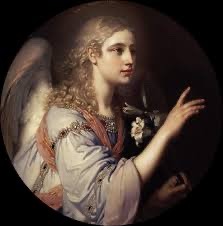
Gabriel is one of the most esteemed and highest angel rank, People sometimes ask for archangel Gabriel's help to clear away confusion and achieve the wisdom they need to make decisions, obtain the confidence they need to act on those decisions, communicate effectively to other people, and raise children well.
Gabriel's Symbols
Gabriel is often depicted in art blowing a horn. Other symbols that represent Gabriel include a lantern, a mirror, a shield, a lily, a scepter, a spear, and an olive branch. His light energy color is white & copper

Role in Religious Texts
Gabriel plays an important role in the religious texts of Islam, Judaism, and Christianity.
The founder of Islam, the prophet Muhammad, said that Gabriel appeared to him to dictate the entire Qur’an. In Al Baqarah 2:97, the Qur’an declares:
“Who is an enemy to Gabriel! For he brings down the (revelation) to thy heart by God's will, a confirmation of what went before, and guidance and glad tidings for those who believe."
In the Hadith, Gabriel again appears to Muhammad and quizzes him about Islam’s tenets. Muslims believe that Gabriel gave the prophet Abraham a stone known as the Black Stone of Kaaba; Muslims who travel on pilgrimages to Mecca, Saudi Arabia kiss that stone.
Muslims, Jews, and Christians all believe that Gabriel delivered news of the upcoming births of three famous religious figures: Isaac, John the Baptist, and Jesus Christ. So people sometimes associate Gabriel with childbirth, adoption, and raising children. Jewish tradition says that Gabriel instructs babies before they’re born. In the Torah, Gabriel interprets the prophet Daniel’s visions, saying in Daniel 9:22 that he has come to give Daniel “insight and understanding.” Jews believe that, in heaven, Gabriel stands beside God’s throne at God’s left hand.

God sometimes charges Gabriel with expressing his judgment against sinful people, Jewish beliefs say, as God did when he sent Gabriel to use fire to destroy the ancient cities of Sodom and Gomorrah that were filled with wicked people.
Christians often think of Gabriel informing the Virgin Mary that God has chosen her to become the mother of Jesus Christ. The Bible quotes Gabriel as telling Mary in Luke 1:30-31:
“Do not be afraid, Mary; you have found favor with God. You will conceive and give birth to a son, and you are to call him Jesus. He will be great and will be called the Son of the Most High.”
During the same visit, Gabriel informs Mary of her cousin Elizabeth’s pregnancy with John the Baptist. Mary’s response to Gabriel’s news in Luke 1:46-55 became the words to a famous Catholic prayer called “The Magnificat,” which begins: “My soul magnifies the Lord and my spirit rejoices in God my savior.” Christian tradition says that Gabriel will be the angel God chooses to blow a horn to wake the dead on Judgment Day.
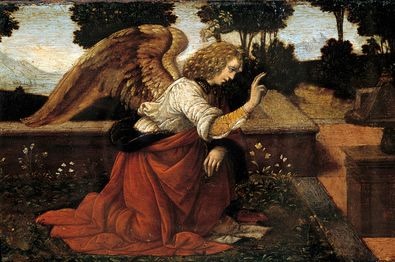
The Bahai faith says that Gabriel is one of God’s manifestations sent to give people, like the prophet Bahá'u'lláh, wisdom.
Other Religious Roles
People from some Christian denominations, such as the Catholic and Orthodox churches, consider Gabriel a saint. He serves as the patron saint of journalists, teachers, clergy people, diplomats, ambassadors, and postal workers.
Archangel Gabriel is known as the angel of revelation or announcement. He plays a significant role in Christianity, Islam, Judaism, and many other faiths, acting as a messenger for God.
In the Bible, Gabriel can be found in the books of Luke and Daniel. He is also known as the "Christmas Angel," for announcing the coming birth of Jesus to Mary and the shepherds.
It is believed that Gabriel can be recognized by a white or copper light and that he often delivers his messages to people in dreams, acting as their guardian angel.
Guidance for the Future
When you get sudden insights that give you valuable guidance for the future, it may be Gabriel sending you a message. As the angel of water, one of Gabriel's specialties is communicating a sense of clarity.

Doreen Virtue's book "Archangels 101" offers a glimpse into this. "Gabriel," Virtue writes, "often announces what's on the horizon, and acts like a manager or agent in orchestrating new ventures related to one’s soul purpose."
Author Richard Webster writes that "Gabriel aids visions, and can also help you get glimpses of the future...If you feel trapped, locked in, or are simply in a rut, call on Gabriel to help you change and start moving ahead again...The gift of prophecy can be yours, if you ask Gabriel to help."
Help Solving Problems
If an idea about how to solve a challenging problem comes to you (especially after praying for a solution), it may be a sign that Gabriel is with you.
In "Gabriel," Webster writes that the guardian angel sometimes offers ideas for solutions while people are meditating or asking Gabriel what to do about their problems:
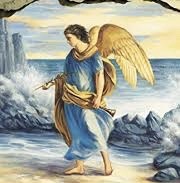
"The most usual form of communication is for thoughts and insights to come into your conscious mind. Ask Gabriel to clarify anything you do not understand. By the end of the conversation, you should know exactly what to do."
Messages in Dreams
Gabriel often visits people while they're dreaming. For example, Christian tradition says that Gabriel is the angel in the Bible who tells Joseph in a dream that he will serve as the father of Jesus Christ on Earth.
In their book "Dreaming With the Archangels: A Spiritual Guide to Dream Journeying," Linda and Peter Miller-Russo write that Gabriel and other archangels may work during your dreams to solve problems if you invite them to do so before going to sleep:
"You should awaken with a dream-world memory that contains the solution (or a seed to the solution) to your problem. Sometimes you will not remember having a dream at all. Yet the answer to the problem will come to your conscious awareness later in the day."
Gabriel often hopes that his appearances in people's dreams will inspire them to pursue greater purity in their lives, write the Miller-Russos. "Gabriel has appeared to people as both a male angel and a female angel. When meeting him, one can sense the purpose that emanates from him."
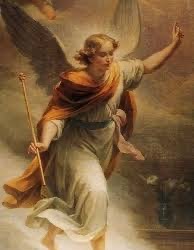
The Miller-Russos quote a message that they say Gabriel delivered to them:
"Purification of the self builds strength and opens the channels of communication between you and the beings on the higher planes. The wisdom of your guardian angel, the archangels, and your spirit guides is more easily understood and integrated by those who devote themselves to the purification of their heart and mind."
Challenging Messages
Many people say that they feel challenged to take on a great responsibility when Gabriel communicates with them. Historically, the messages that Gabriel delivers often ask people to do something for God. Religious texts record that the people whom Gabriel visits sometimes feel troubled when they ponder his messages.
The Qur'an says that it was Gabriel who miraculously revealed the truth to the prophet Muhammad. He wrote that Gabriel's visits to him were stressful and challenging.
George W. Braswell illustrates this in his book "What You Need to Know About Islam and Muslims." He writes that "[t]here was physical and psychological stress upon Muhammad as he encountered the angel Gabriel, who gave him the words to recite."
In his book "In the Footsteps of the Prophet: Lessons from the Life of Muhammad," Tariq Ramadan describes Gabriel's challenging visits to Muhammad:
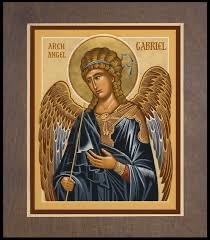
"The angel Gabriel appeared to him several times. The prophet was later to report that the angel sometimes appeared to him in his angelic persona and sometimes as a human being. At other times, the prophet would hear a bell-like sound and revelation would come suddenly, requiring of him such extreme concentration that he came close to asphyxiation."
When Gabriel appeared to the Virgin Mary to announce that she would serve as Jesus Christ's mother on Earth, the Bible records that Mary was uncomfortable at first. "Mary was greatly troubled at his words and wondered what kind of greeting this might be" (Luke 1:29).
In her book "Women in the New Testament," Mary Ann Getty-Sullivan describes this encounter.
"The angel Gabriel appears unexpectedly...After greeting Mary, the angel begins the message from God, saying 'Do not be afraid.' The attitude of awe or reverence, expressed as fear, is typical for those who experience an epiphany...Mary is troubled at hearing the greeting of the angel. Her confusion is based on both the appearance of the angel and on what the angel has said."
A White or Copper Light
You may see either white or copper light around you when Gabriel is nearby. Believers say that Gabriel's electromagnetic energy corresponds to the white angel light ray and his aura is a copper color.
In her book "Psychic Children," Joanne Brocas writes that "Archangel Gabriel is associated with a beautiful white light and this color brings purification to wherever it is needed. Imagine this white light enfolding and surrounding you and your child and ask that it help dissolve any stress or worries that may be affecting either of you."

Gabriel is typically portrayed with a large copper trumpet, signifying his delivery of messages. He is often identified by a copper-colored halo or flashes of copper light. Some people also believe that a sudden and unusual attraction to objects made of copper is another sign that they're working with Archangel Gabriel.
I hope you enjoyed this blog more to follow
Culture Calypso’s Blog ✨🕊
4 notes
·
View notes
Text
A Collection of Depictions of Michael and Gabriel
I made this as a Twitter thread earlier this year. I decided to post this on Tumblr because why not? Since this format is more effective and fitting than on Twitter.
Also, I made this thread with the intense purpose to ship Michael/Gabriel
Keep in mind that some needed some speculation, and I took all of my info on Wikipedia. I did some research myself but I got lazy during it so a lot of info may be wrong or inaccurate, so please be mindful of that.
The first time they’re mentioned at the same time is during The Book of Daniel (Daniel 10:13), where a ‘man in lenin’ told Daniel the Prince of Persia had resisted them for 21 days from delivering the message to him and that Michael had helped them. Some people speculate that this could be Gabriel because of Daniel's initial (They were introduced earlier) and current reaction to them, which is fear (or more precisely, trembling on hands and knees). But others say that it wouldn’t be them because their name are not mentioned during the passage, and that Daniel had met Gabriel before, so it’s weird for him to choose to be scared twice.
Another thing that supports the man being Gabriel is that the man in lenin is mentioned again in The Book of Ezekiel, where they followed the orders of God to mark those who would survive the massacre of Israel. Drawing a mark can be interpreted as ‘sending a message’, and it fits considering Gabriel’s role in the New Testament is sending the news to Zechariah and Mary about the birth of John The Baptist and Jesus.
But again, this is pure speculation. This angel may or may not be Gabriel. The reason I put this here is because this is the very first depiction where Michael and Gabriel (sort of) are mentioned together in the canon Biblical text, and possibly the only canon depiction from the canon Bible. And also I wanna be delusional and think it’s Gabriel for personal reasons anjkdhsjd
Carrying on, in Judaism, there’s a quote saying, “When a man is in need, he must pray directly to God, and neither to Michael nor to Gabriel." Michael and Gabriel are said to be the guardian angels of Israel.
In Kabbalah literature, Gabriel is portrayed as working in concert with Michael as part of God’s court.
In Eastern Orthodox, Michael and Gabriel are considered to be the guardian angels of the Church.
Within Anglicanism, there is a controversial proposal written by bishop Robert Clayton that proposes that Michael is the Logos (a title connected to the trinity) and Gabriel is the Holy Spirit.

I actually tried to check it out myself, but it’s like, 400 pages long and I can’t be asked to read the entire thing so I just skimmed through and read the parts where Michael and Gabriel are mentioned. I could only find Gabriel being mentioned as the Holy Spirit, I’m sure that the previous pages did mention Michael as the Logos, but again, I’m too lazy to go back and practically gave up by the end of it. So it’s better to read it yourself if you’re interested.
Fun fact about this depiction by Robert Clayton is that apparently, it was so controversial that the government ordered his prosecution, but he died before his scheduled examination.
Moving on, in Islam, Michael is often paired with Gabriel. A version of a hadith by an-Nasa’i, Muhammad is quoted saying that Michael and Gabriel came to him and sat down by his left and right side respectively. With Gabriel telling him to recite the Qu’ran in one mode, while Michael telling him to ask more until he reached seven modes.
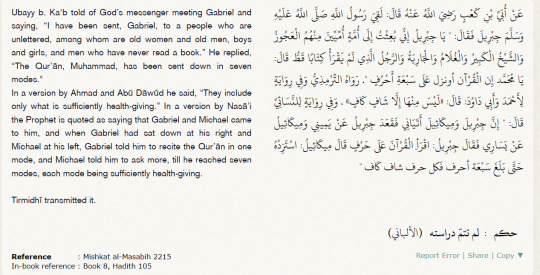
According to another hadith in Sahih Muslim, Michael and Gabriel accompanied him on the day of the Battle of Uhud.
In artistic depictions, the two Archangels are depicted together since the 8th century e.g the stone casket at the Notre Dame de Mortain church in France.
Though there is another artistic depiction of them, in the reproduced image of Our Mother of Perpetual Help, an icon of the Cretan school, depicts Michael on the left carrying the lance and sponge of the crucifixion of Jesus, with Gabriel being on the right side of Mary and Jesus.
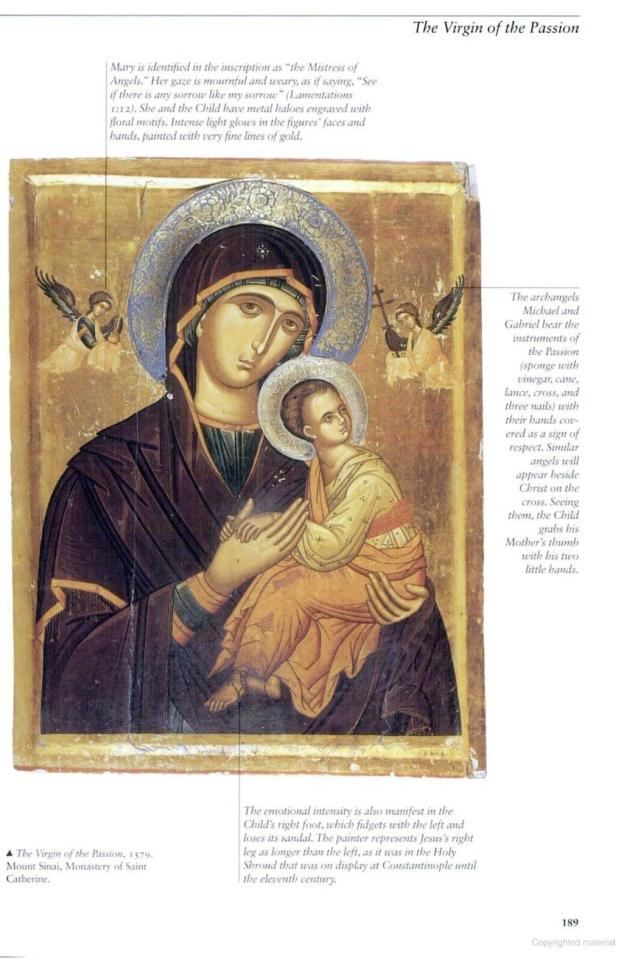
Another artistic depiction is Justice Between the Archangels Michael and Gabriel by Jacobello del Fiore.
Soo that’s all for this blog. If you made it this far, thank you so much!! If you have any extra information about them, or correct or clarify any info, feel free to do so!
It means the world to me that you’re willing to hear my ramblings. Hope you gained something from this and have a nice day!
Sources:
#megaten#megami tensei#smt#law#michael#gabriel#archangel#angel#bible#bible study#ig???#idk what to tag here lol
5 notes
·
View notes
Text
Hadith on Isra and Meraj, the night journey of the Prophet(Pbuh)
Hadith on Isra and Meraj, the night journey of the Prophet(Pbuh)
Shabe Meraj and Shabe barat are different
Shabe Meraj is a story of how prophet Muhammad sallalahu alaihe wa sallam’s heart was purified by the archangel Gabriel Alaihe Salam, who filled him with knowledge and faith and prepared him to enter the seven levels of heaven. The story of Shabe meraj is a true incident and is also…
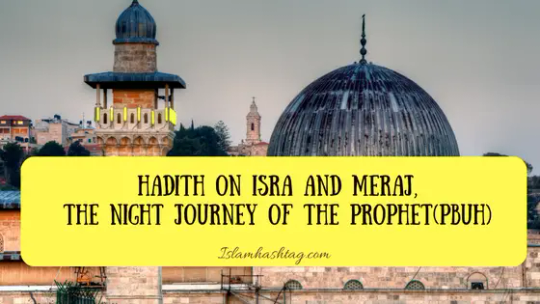
View On WordPress
0 notes
Text
How was the Revelation conveyed to the Prophet?
The Revelation was delivered to Prophet Muhammad in the following ways:
The commencement of Revelation to the Prophet took the form of reliable dreams ( ru’ya al-sadiqa).
Whatever he dreamed happened the following day, in exactly the same way that he had dreamed.
Coming in the form of a human being, Archangel Gabriel conveyed the Revelation to the Prophet.
Archangel Gabriel approached the Prophet in his own angelic form and thus delivered the Revelation to him.
It was reported that such Revelation happened only two times;
first, during the first stage of the Revelation and
second, in the cave of Hira, following a period of temporary cessation of Revelation.
Without appearing to the Prophet, the angel put the Revelation straight into the Prophet’s heart when he was awake.
Archangel Gabriel conveyed the Revelation to the Prophet during his sleep.
Sometimes, the Qur’an was revealed like the ringing of a bell.
This form of Revelation was most severe for the Prophet. When this state of Revelation passed the Prophet had memorized what had been revealed.
Delivery of the Revelation to the Prophet when he was awake, directly by God Almighty Himself.
It was reported that such Revelation was delivered to the Prophet during the Mi’raj – the Prophet’s night journey from Mecca to Al-Aqsa Mosque in Jerusalem and his ascension from there to Heaven.
Is there any Revelation other than The Qur’an?
The Revelation is not only the Qur’an; Prophet Muhammad received Revelation in addition to the Qur’an. God’s Messenger said,
“Beware, I have been given the Qur’an and its like together with it.”
This is clear proof of the fact that God’s Messenger received the Revelation from God in addition to what is contained in the Qur’an, and he acted according to it. What is meant by the “like of the Qur’an” in the hadith is the Sunna, or practices of the Prophet. This clearly shows that God’s Messenger was given Revelation in addition to the Qur’an which was not recited to him as the Qur’an. Thus, in the same way that the Qur’an is a Revelation sent to the Prophet, the Sunna was also revealed to him. The only difference is that while the Qur’an was revealed in recited ( matlu) form, the Sunna was the non-recited Revelation ( wahy al-ghayri matlu). This is why it is obligatory to imitate and follow the example of the Prophet when performing acts of worship, like the daily prayers and the pilgrimage to Mecca, which have not been explained in detail in the Qur’an. Therefore, it is necessary to depend upon the Sunna in order to understand the Book and to practice it in daily life correctly and completely as God Almighty commands in the Qur’an:
“And We have not sent down the Book on you except that you (O Muhammad) may explain to them all (the questions of faith and law) on which they differ, and as guidance and mercy for people who will believe and who have already believed” (Nahl 16:64).
It is the Prophet’s mission to present and also represent the religion in its pristine purity and truth. The Sunna, which is a combination of the sayings, actions and tacit approval of the Prophet, is sanctioned by God and relies on the guidance of Divine Revelation. Thus, if we look for information on a particular subject in the Qur’an but are unable to find it, we then have to refer to the Prophet’s practices, or his Sunna, which is a commentary and explanation of the Qur’an. Pertaining to this subject, the Prophet once asked Muadh ibn Jabal, whom he was sent as an envoy to Yemen: “‘With what will you rule?’ ‘With God’s Book’ Muadh replied. ‘What if you cannot find the ruling in the Qur’an?’ the Prophet asked. ‘Then with the Sunna of God’s Messenger’ Muadh replied. ‘What if you cannot find it there either?’ asked the Prophet. ‘Then I would rule with my own opinion (with my own understanding and interpretation)’ Muadh finally replied. Upon this response, the Prophet put his hand over Muadh’s chest and said, ‘All praise be to God for He has rendered the envoy of God’s Messenger successful and guided him to that which pleases God’s Messenger.’”
In particular, the Prophet warned those people who follow only the Qur’an and who reject his Sunna with the following words:
“Let me not find one of you reclining on his couch when he hears something that I have commanded or forbidden, saying: ‘We don’t know (any such a thing as Sunna. God’s Book is at our disposal.) We follow what we find in God’s Book.’
There are many Qur’anic verses that act as evidence that Prophet Muhammad, peace and blessings be upon him, received Revelation from God in addition to the Qur’an. The following two verses, for instance, are of this type:
“… Whatever the Messenger gives you accept it willingly, and whatever he forbids you, refrain from it. Keep from disobedience to God in reverence for Him and piety. Surely God is severe in retribution” (Hashr 59:7) and
“… And on you (O Muhammad) We have sent down the Reminder so that you may make clear to humankind whatever is sent down to them, and that they may reflect” (Nahl 16:44).
All the above-mentioned factors clearly indicate that the Revelation which was sent to God’s Messenger was not only composed of what is found in the Qur’an, but includes non-recited Revelation in Sunna form. As a matter of fact, it is not possible for us to know or understand completely the various aspects of the religion without referring to the practices of the Prophet.
What does Revelation ( wahy) mean?
The Arabic word wahy literally means to communicate secretly, to the decree, to reveal, indicate, to inspire, speak through inspiration or revelation, to suggest, to make signs, to call, to whisper, to write, to hasten.
As a term, wahy means God’s communication of His Messages to His Prophets in a special way, the exact nature of which we cannot know.
The term wahy is used in the Qur’an in both its specific and general senses. In its specific sense, wahy is God’s Revelation to the Prophets and, in its general sense, it is God’s assigning all existing things with their forms and functions, as the sole Creator, and guiding them to the fulfillment of the aim and purpose of their existence.
We may describe revelation, or wahy, in its specific sense as God’s conveyance of His guidance and commandments to His Prophets, who were chosen from among all human beings.
As for the means of the Revelation, the word passes from God to the human being in one of the following three ways:
By way of revelation through the inspiration of the heart or dreams during sleep. God Almighty sent His message to the mother of Prophet Moses by inspiration and Prophet Abraham was inspired with the sacrifice of his son through a dream.
Another kind of revelation is when God spoke to a Prophet from behind a veil without the mediation of an angel. Prophet Moses was addressed in this way for instance.
God’s third way of communicating with human beings is that He sends an angel to convey His Revelation to a Prophet.
Revelation is evidence for the prophethood of not only Prophet Muhammad, but for all the Prophets.
To each and every Prophet the Almighty Creator revealed:
We have revealed to you (O Messenger) as We revealed to Noah and the Prophets after him; and We revealed to Abraham, Ishmael, Isaac, Jacob and the Prophets who were raised in the tribes, and Jesus, Job, Jonah, Aaron, and Solomon; and We gave David the Psalms. And Messengers We have already told you of (with respect to their mission) before, and Messengers We have not told you of, and God spoke to Moses in a particular way. (Nisa 4:163–164)
The clearest difference between the Prophets and other human beings lies in the divine reality of Revelation.
Why was the Qur’an revealed to Prophet Muhammad but not to people who were better-known or better-off?
Prophethood is not a quality that can be gained or acquired with effort; rather all Prophets were divinely appointed.
If God appointed a person as Prophet, that person was a Prophet even if the people did not believe in him or refused to obey him. Indeed, unbelievers made objections and protests to every Prophet for various reasons.
Prophet Muhammad, (peace and blessings be upon him), too was subjected to such treatment and the question
“Why was prophethood given to him but not to others?”
was asked. The polytheists asked to be given the like of what God’s Messenger had been given, as they wanted to be followed instead of being the followers and to be served instead of being the servants.
God Almighty responded to what the nonbelievers wrongly claimed as follows:
“When a Revelation is conveyed to them, they say: ‘We will not believe unless we are given the like of what God’s Messengers were given.’ God knows best upon whom to place His Message. Soon will an abasement from God’s Presence befall these criminals and severe punishment for their scheming” (An’am 6:124).
It was reported that this verse was revealed to the Prophet when Abu Jahl said:
“We will neither obey him nor be contented with him unless revelation is sent down to us as it has been sent down to him”
and when the polytheist Meccan chieftain, Walid ibn Mughira, said to the Prophet:
“If there were such thing as ‘prophethood,’ I would be more deserving of it than you, as I am older and richer than you.”
According to the Meccan polytheists, prophethood should only have been given to those who ad wealth, position and posts in Mecca or in Taif, the major cities of the region. According to their standards of importance, the Meccans did not perceive the Prophet as being equal to them in wealth or status and they, therefore, claimed that the Revelation should not have been sent to him.
As such reasoning is fundamentally wrong, God warned those who were, with their false and baseless reasoning, trying to direct the Divine Revelation and trying to nominate persons for such a mission on God’s behalf:
They also say: “If only this Qur’an had been sent down on a man of the leading position of the two (chief) cities!” Is it they who distribute the mercy of your Lord (so that they may appoint whom they wish as Messenger to receive the Book)? (Moreover, how do they presume to value some above others only because of their wealth or status, when) it is also We Who distribute their means of livelihood among them in the life of this world, and raise some of them above others in degree, so that they may avail themselves of one another’s help? But your Lord’s mercy (in particular Prophethood) is better than what they amass (in this life). (Zukhruf 43:31-32)
So, prophethood is a matter that belongs to God; He appoints whomever He deems fit to this mission. While granting the Prophet the mission of Prophethood, God did not consult anybody about this matter. Nor did the Prophet receive this mission due to his hard work or because of any worldly possessions. God conferred a great favor on Prophet Muhammad, peace and blessings be upon him when He granted him this mission of prophethood.
#Allah#god#islam#quran#muslim#revert#revert islam#convert#convert islam#converthelp#reverthelp#revert help#revert help team#help#islam help#salah#dua#prayer#pray#reminder#religion#mohammad#muslimah#hijab#new muslim#new revert#new convert#how to convert to islam#convert to islam#welcome to islam
1 note
·
View note
Text
"Allah is Just the Holy Spirit." From Surah 3, Ali Imran, "Mary's Ancestor."
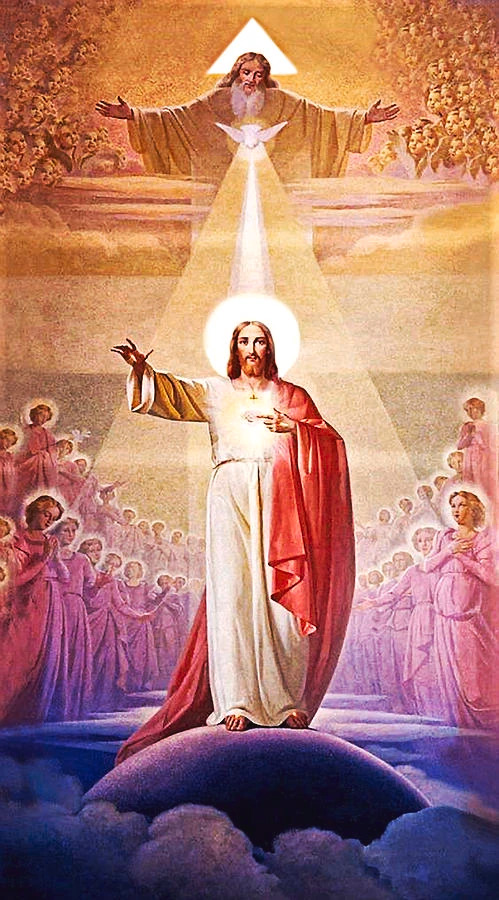
3:27-32
You cause the night to enter the day, and You cause the day to enter the night; and You bring the living out of the dead, and You bring the dead out of the living. And You give provision to whom You will without account."
Let not believers take disbelievers as allies rather than believers. And whoever [of you] does that has nothing with Allah, except when taking precaution against them in prudence. And Allah warns you of Himself, and to Allah is the [final] destination.
Say, "Whether you conceal what is in your breasts or reveal it, Allah knows it. And He knows that which is in the heavens and that which is on the earth. And Allah is over all things competent.
The Day every soul will find what it has done of good present [before it] and what it has done of evil, it will wish that between itself and that [evil] was a great distance. And Allah warns you of Himself, and Allah is Kind to [His] servants."
Say, [O Muhammad], "If you should love Allah, then follow me, [so] Allah will love you and forgive you your sins. And Allah is Forgiving and Merciful."
Say, "Obey Allah and the Messenger." But if they turn away - then indeed, Allah does not like the disbelievers.
If we are going to establish God is a Father and the maker of the Son, and the process took place during the transition between what is infinite what is finite, then we need, as the verses state, to establish Allah is the Holy Spirit foremost.
The Quran says "Allah warns; He is the destination, he is present and He is at a distance." This concept, called Ruh, explains how God infiltrates all reality, all consciousness, relays all thought, intuition and experience throughout creation, specifically in the transfiguration of ordinary organic matter and human tissue into the Christ:
Rūḥ al-qudus (Arabic: روح القدس, "the holy spirit" or "spirit of holiness"), ar-rūḥ al-amin (Arabic: الروح الأمين, "the faithful/trustworthy spirit"), is a Quranic expression that describes a source or means of prophetic revelations, commonly identified with the angel Gabriel.[11][12][13] Quranic commentators disagreed in their identification of Gabriel with various uses of the word rūḥ.[13][14] For some, ar-rūḥ is simply the angelic quality bestowed upon humans, but not an angel himself.
The phrase rūḥ al-qudus, commonly translated as the "holy spirit" or the "spirit of holiness", occurs four times in the Quran,[13] in Quran 2:87 and 253,[15] Al-Ma'idah verse 110,[16] and An-Nahl verse 102.[17] In three instances, it is described as the means by which God "strengthened" Jesus, and in the fourth it is identified as the one brought down God's truth to his prophet.[13]
As interpreted to refer to the Archangel Gabriel[edit]
The term Rūḥ al-Qudus is also an epithet referring to the Archangel Gabriel,[18] who is related as the Angel of revelation and was assigned by God to reveal the Qurʼan to the Islamic prophet Muhammad and who delivered the Annunciation to Mary.[19]
In the two suras in which the Qur'an refers to the angel Gabriel, it does so by name.[20] However, some hadiths and parts of the Qurʼan may arguably lend support to the alternative view.
It appears to be indicated by the Quran in sura Maryam, ayat 17–21, that it was the angel Gabriel who gave to Mary the tidings that she was to have a son as a virgin:
"screening herself off from them. Then We sent to her Our angel, ˹Gabriel,˺ appearing before her as a man, perfectly formed. She appealed, “I truly seek refuge in the Most Compassionate from you! ˹So leave me alone˺ if you are God-fearing.” He responded, “I am only a messenger from your Lord, ˹sent˺ to bless you with a pure son.”
She wondered, “How can I have a son when no man has ever touched me, nor am I unchaste?” He replied, “So will it be! Your Lord says, ‘It is easy for Me. And so will We make him a sign for humanity and a mercy from Us.’ It is a matter ˹already˺ decreed.”
0 notes
Text
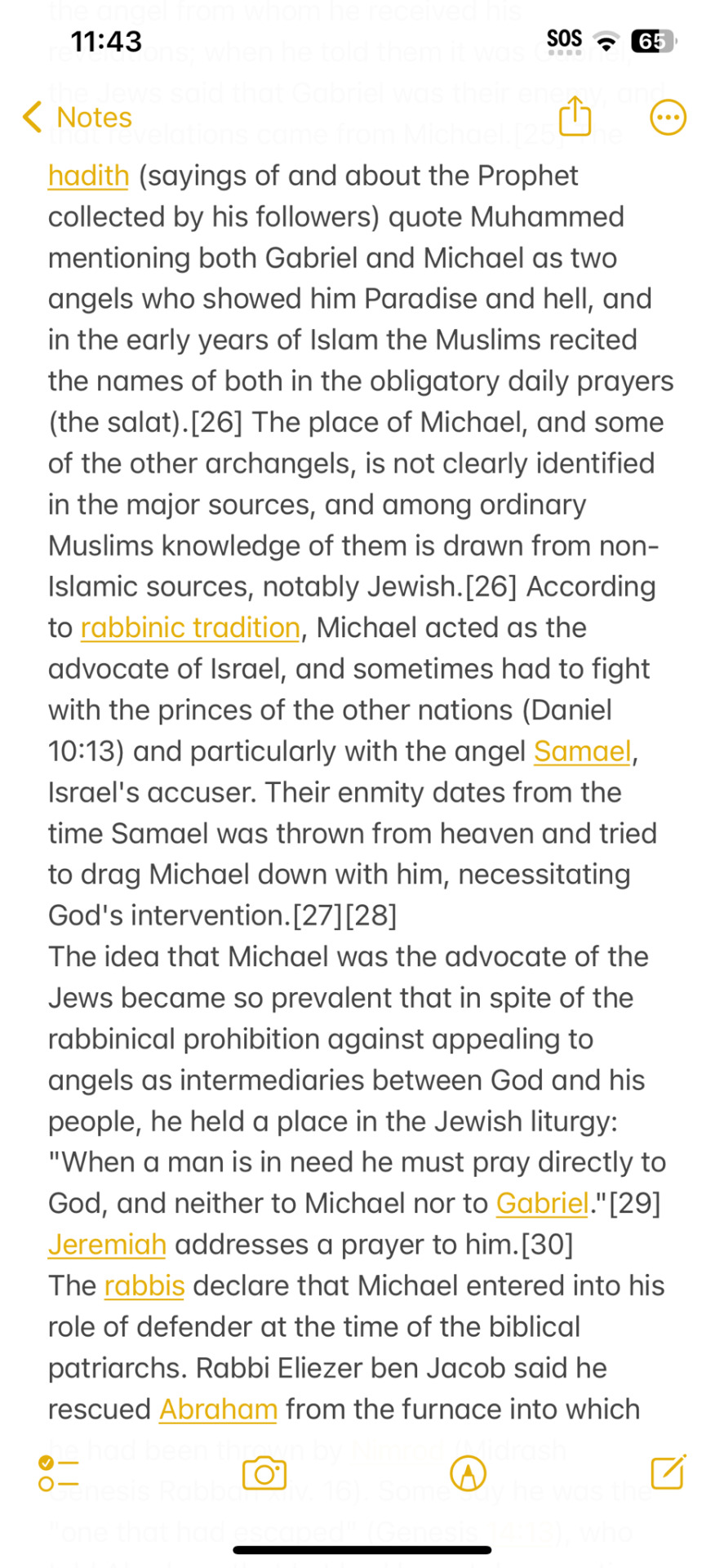
hadith (sayings of and about the Prophet collected by his followers) quote Muhammed mentioning both Gabriel and Michael as two angels who showed him Paradise and hell, and in the early years of Islam the Muslims recited the names of both in the obligatory daily prayers (the salat). [26] The place of Michael, and some of the other archangels, is not clearly identified in the major sources, and among ordinary Muslims knowledge of them is drawn from non-Islamic sources, notably Jewish. [26] According to rabbinic tradition, Michael acted as the advocate of Israel, and sometimes had to fight with the princes of the other nations (Daniel
10:13) and particularly with the angel Samael, Israel's accuser. Their enmity dates from the time Samael was thrown from heaven and tried to drag Michael down with him, necessitating
God's intervention. [271|28]
The idea that Michael was the advocate of the Jews became so prevalent that in spite of the rabbinical prohibition against appealing to angels as intermediaries between God and his people, he held a place in the Jewish liturgy:
"When a man is in need he must pray directly to God, and neither to Michael nor to Gabriel."[29] Jeremiah addresses a prayer to him. [30]
The rabbis declare that Michael entered into his role of defender at the time of the biblical patriarchs. Rabbi Eliezer ben Jacob said he rescued Abraham from the furnace into whichs CLONES
1 note
·
View note
Text
The Hadith of Archangel Gabriel
New Post has been published on http://www.truth-seeker.info/does-god-exist/the-hadith-of-archangel-gabriel/
The Hadith of Archangel Gabriel
By Sachiko Murata, William C. Chittick
The Hadith of Archangel Gabriel
Umar ibn al-Khattab said: One day when we were with God’s messenger, a man with very white clothing and very black hair came up to us. No mark of travel was visible on him, and none of us recognized him. Sitting down before the Prophet, leaning his knees against his, and placing his hands on his thighs, he said, “Tell me, Muhammad, about submission.”
He replied, ‘Submission means that you should bear witness that there is no god but God and that Muhammad is God’s messenger, that you should perform the ritual prayer, pay the alms tax, fast during Ramadan, and make the pilgrimage to the House if you are able to go there.”
The man said, “You have spoken the truth.” We were surprised at his questioning him and then declaring that he had spoken the truth. He said “Now tell me about faith.”
He replied, “Faith means that you have faith in God, His angels, His books, His messengers, and the Last Day, and that you have faith in the measuring out, both its good and its evil.”
Remarking that he had spoken the truth, he then said, “Now tell me about doing what is beautiful.”
He replied, “Doing what is beautiful means that you should worship God as if you see Him, for even if you do not see Him, He sees you.”
Then the man said, “Tell me about the Hour”
The Prophet replied, “About that he who is questioned knows no more than the questioner.”
The man said, “Then tell me about its marks.”
He said, “The slave girl will give birth to her mistress, and you will see the barefoot, the naked, the destitute, and the shepherds vying with each other in building.”
Then the man went away. After I had waited for a long time, the Prophet said to me, “Do you know who the questioner was, ‘Umar?” I replied, “God and His messenger know best. “He said, “He was Gabriel. He came to teach you your religion. ”
To begin explaining the meaning of this hadith let us flesh it out by adding some background information that would be obvious to the original listeners but not to a reader situated many centuries and miles away.
Try to imagine the situation. The Messenger of God, at the time the greatest human being on the face of the earth (as far as his companions were concerned – and the historical record bears them out), is sitting at the edge of an oasis in Medina with a group of his companions, that is, people who have accepted that he is the mouthpiece of God. Suddenly a man appears whom no one recognizes.
Medina, at the time, is a tiny community in the midst of the desert (with a population of several hundred or perhaps a few thousand). Everyone knows everyone. If a traveler arrives, it is no small event, given the difficulty of travel and the small population. Everyone learns about new arrivals within hours. The system of personal relationships established by familial, tribal, and other bonds ensures that news is spread around much more efficiently than can ever be accomplished by today’s six o’clock news. A man appears whom no one knows, but no one has arrived in town for several days, except the uncle of so and so, whom several of them have already seen.
Not only do the companions fail to recognize the man, but he also shows no signs of travel, which is very strange. If they do not know him, then he must be a newly arrived traveler. Someone would not be able to freshen up that quickly after several days of travel in the desert, even if he had traveled only by night on the back of a camel. (You think you feel bad after six hours in a car-think of six days in the hottest and dustiest environment you can imagine, with no air-conditioned rest stops for coffee or soda.)
As soon as the man arrives, everyone is all ears. Who can this person be, and how did he get here without our knowing about it? Next strange fact: The man is obviously on familiar terms with the Prophet of God. He comes right up to him and kneels down in front of him, his knees against the Prophet’s knees. Notice that the Prophet himself is kneeling, not in prayer as modern Westerners might kneel, but simply because kneeling is, for most Orientals, the simplest and at the same time the most respectful way to sit. Remember that, even in houses, chairs were unheard of. People sat on the ground, as they still do in much of the world and this includes some of the richest and most sophisticated parts of the world, such as Japan. For most of the ancient world, chairs were the prerogative of kings.
You would not go right up to a person and kneel with your knees touching his unless he were, for example, your brother or a very close friend. The normal procedure, even if the person sitting there was just an ordinary person, would be to greet him from a respectful distance and keep the distance. But the stranger from the desert obviously knows Muhammad very well. He even places his hands upon Muhammad’s thighs, which would be an unheard of piece of effrontery if the man were a stranger. Then the man addresses Muhammad by his name, whereas people always address him by his title, Messenger of God. The man begins talking without introduction as if he had been part of the conversation all along.
Once Muhammad answers the man’s first question, the man says, “You have spoken the truth.” ‘Umar remarks, “We were surprised at his questioning him and then declaring that he had spoken the truth.” This is an enormous understatement. More likely, the companions were flabbergasted. What kind of insolence is this? To come up to God’s own messenger and begin to grill him, and then to pat him on the head as if he were a schoolboy! This is inconceivable. But then again, the companions took their clues from Muhammad. He was acting as if all this were perfectly normal and natural. What could they do but follow his example?
After the man leaves, Muhammad waits awhile, allowing his companions to think about this strange event. Finally, he tells them what had happened. They would not soon forget, and you can be sure that by that night, everyone in Medina had heard about Gabriel’s appearance. No one was supposed to forget about this visit, for the Prophet had just presented them with their religion in a nutshell. If they ever wanted to know what was essential in Islam, all they had to do was remember the strange events of this day.
———–
Excerpted from the book “The Vision of Islam” by Sachiko Murata and William C. Chttick.
1 note
·
View note
Link
#religion#islam#angelology#quran#hadith#archangel gabriel#archangel raphael#archangel michael#archangel azrael#ridwan#malik#guardian angels#angels#article#divinum-pacis
13 notes
·
View notes
Text
4 Main Angels and Their Duties;
Hazrat Jibrael/Gabriel (Alayhi Salam): The Archangel
Jibreel (Alayhi Salam) is one of the four greatest Angels and is responsible for bringing the Revelation. He delivers the Divine Revelations from Almighty Allah to His chosen Messengers from among the Prophets (May peace be upon them all) which brings life into the hearts.
He is mentioned in the Quranic verses as “the spirit, Rasulun Karim, Ruh al-Amin and Ruh al-Qudus”. In addition to these, in one of the Hadiths, he is called “an-Namus”, the keeper of the secret (Revelation). This is the opposite of jasoos, a spy, which generally has negative or evil connotations.
Hazrat Mikaa’eel/Michael (Alayhi Salam): Angel in charge of distributing God’s sustenance
The Angel that controls the events in this realm Hazrat Mikaa’eel is responsible for the raindrops, which bring life to the earth after its death.
Mikaa’eel (Alayhi Salam) is the Angel that manages the divine work of arts that are planted on the field of earth with the power of Allah and His order.
He is responsible for the pouring of rain, the blowing of the wind, natural events such as the ordering of seasons and the management of supplications of the created beings.
Hazrat Israfel/Raphael (Alayhi Salam): The Angel of the Trumpet
The Angel that will blow the trumpet is called Israfel (Alayhi Salam). His name is mentioned among the four great Angels in the Hadiths. Hazrat Israfel will blow into the trumpet twice: Once, for the destruction of the universe; and again, for the Resurrection of all accountable beings to face Judgment Day. Because of this duty of him, He is called the Angel of Soor (the Trumpet).
Abu Sa`id Al-Khudri (may Allah be pleased with him) reported: The Messenger of Allah (may peace and blessings be upon him) said, “How can I feel at ease when the Angel of the Trumpet (Israfil) has put his lips to the Trumpet and is waiting for the order to blow it.” - Hadith Al-Tirmidhi [Vol. 4, Book 11, Hadith 2431]
Israfil has been ready to sound the horn since Allah Almighty created him, his lips are on the trumpet. His gaze is fixed upon Allahs Throne, ready for the command.
Hazrat Izrael/Azrael (Alayhi Salam): The Angel of Death
The most fearsome of them all, who does not delay nor expedite the hour of claiming the soul.
His duty is to grasp the souls of people whose death times have come. He is called as “Malak-ul Mawt”, that is, the Angel of death. He is the one in charge of seizing the souls after they have been rounded up in the last stage (of death).
It is mentioned in the Holy Quran –“Say: The Angel of Death, put in charge of you, will (duly) take your souls: then shall ye be brought back to your Lord.” - The Holy Quran - [Surah as-Sajda]
Death is ascribed to Allah Almighty here because He is the One who orders it to occur. It is also ascribed to the Angels because they are the ones who physically carry that out by gathering the soul and leading it out of the human’s body until it reaches his throat.
#angels of light#arch angel#spiritual knowledge#archangel gabriel#the end is near#religion quotes#spirituality#spiritual guidance#the world we live in#religious studies#spiritual quotes#islamic reminders#deen#welcome to islam#god quotes#islamic post#islam#something to read#islamic knowledge#islamic quotes#islamdaily#sunni muslims#quran quotes#hadith#prophet muhammad#lessons to learn#judgement day#how the world works#death quotes#christianity
19 notes
·
View notes
Text
The Spirit In The Intermediate World
Following death, the spirit is taken to the Presence of God. If it led a good, virtuous life and refined itself, the angels charged with taking it there wrap it in a piece of satin and bear it, through the heavens and all inner dimensions of existence, to His Presence. During this journey, angels welcome it in every mansion or station it passes and ask: "Whose spirit is this? How beautiful it is!" The angels conveying it introduce it with the most beautiful titles it had while in the world, and answer: "This is the spirit of the one who, for example, prayed, fasted, gave alms, and bore all kinds of hardship for God's sake." Finally, God Almighty welcomes it and tells the angels: "Take it back to the grave where its body is buried, so that it can answer the questions of Munkar and Nakir, the interrogating angels."
Whatever misfortune we experience is the result of our own sin. If believers are sincere but cannot always refrain from sin, God, out of His Mercy, allows misfortune to strike so that they may be purified. God may subject them to great agony during death, either to forgive their still unpardoned sins or to promote them to higher (spiritual) ranks, but then take their spirit very gently. If, despite all misfortune and death agonies there are still some unforgiven sins, these people are somehow punished in the grave and so will not be punished in Hell. As the grave is the first station on the journey toward eternal life, it features a preliminary interrogation by two angels into what kind of life the deceased lead. And almost everyone, except Prophets, is subjected to some suffering.
It is recorded in reliable books that 'Abbas, the uncle of the Prophet, upon him be peace and blessings, desired very much to see 'Umar in his dream after the latter had died. When he saw him 6 months later, he asked him: "Where were you until now?" 'Umar replied: "Don't ask me that! I have just finished accounting (for my life)."
Sa'd ibn Mu'adh was among the greatest Companions, may God be pleased with them all. When he died, Archangel Gabriel, upon him be peace, told God's Messenger, upon him be peace and blessings: "The Divine Throne trembled when Sa'd died." Innumerable angels took part in his funeral. After Sa'd, may God be pleased with him, was buried, the Messenger said in amazement: "Glory to God! What (will happen to others) if the grave squeezes (even such people like) Sa'd?"
In the grave, everyone is questioned by the angels Munkar and Nakir. They ask: "Who is your Lord? Who is your Prophet? What is your religion?" and many other questions. If the deceased were believers, they can answer these questions. Otherwise, they cannot. The questions continue concerning their deeds in the world.
The spirit's relationship with the body differs according to which world it inhabits. In this world, the spirit is confined within the prison of the body. If the evil-commanding self and bodily desires dominate it, the spirit inevitably deteriorates and spells the person's final doom. Those who use their willpower in the way taught by God, discipline their evil-commanding selves, nourish their spirits (via belief, worship, and good conduct), and are not enslaved by bodily desires will find their spirits refined, purified, and furnished with laudable qualities. Such people will find happiness in both worlds.
After burial, the spirit waits in the intermediate world between this one and the Hereafter. Although the body decomposes, its essential particles—called in a hadith ajb al-dhanab, which literally means coccyx—do not rot. We do not know whether ajb al-dhanab is a person's genes or something else. Regardless of this ambiguity, however, the spirit continues its relations with the body through it. God will make this part, which is formed of the body's essential particles, atoms, or all its other particles already dispersed in the soil, conducive to eternal life during the final destruction and rebuilding of the universe. He also will use it to recreate us on the Day of Judgment.
The intermediate world is the realm where the spirit feels the "breath" of the bliss of Paradise or the punishment of Hell. If we led a virtuous life in the world, our good deeds (e.g., prayers, recitations, acts of charity) will appear as amiable fellows. Also, windows onto heavenly scenes will be opened for us and, as stated in a hadith, our grave will become like a garden of Paradise. However, if some of our sins still remain unpardoned, regardless of how virtuous we were, we may suffer some punishment in the intermediate world until we become deserving of Paradise. Unbelievers who indulged in sin will be met by their deeds, which will assume the forms of bad fellows and vermin. They will see scenes of Hell, and their graves will become like a pit of Hell.
When we are alive, our spirit suffers pain and feels joy and happiness. Although it feels pain apparently through the nervous system and uses this extremely complicated system to communicate with all bodily parts, scientists still do not understand how it interacts with the body, especially with the brain. Any bodily failure that causes death can make the nervous system stop operating. However, it has been established scientifically that certain brain cells survive for a while after death. Scientists try to receive signals from such cells . If they succeed in doing so and can decipher those signals, it will be useful, especially in criminology, in solving unsolved crimes. For example, the Qur'an tell us how, during the time of Prophet Moses, upon him be peace, God revived a dead person, who identified his killer:
When Moses said to his people: "God commands you to sacrifice a cow" ... they sacrificed her, a thing they had scarcely done. And when you killed a living soul, and disputed thereon—God disclosed what you were hiding—so We said: "Smite him with part of it"; even so He brings to life the dead, and He shows you His signs, that haply you may have understanding. (2:67, 71–73)
As the spirit suffers pain and feels happy, and as it continues its relation with the body (via those essential bodily particles that do not rot) in the intermediate world, it is meaningless to discuss whether the spirit, the body, or both will enjoy Paradise or suffer Hell.
Since the spirit lives the worldly life together with the body and shares all its joys and sorrows, God will resurrect people both bodily and spiritually. The Ahl al-Sunna wa al-Jama'a agree that the spirit and the body will go either to Paradise or Hell together. God will build bodies in forms unique to the Hereafter, where everything will be alive: This life of the world is but a pastime and a game. Lo! the home of the Hereafter, that is life if they but knew (29:64).
Spirits in the intermediate world will see and hear us, provided God allows this. If He does, He may permit some saintly people to see, and hear, and communicate with us.
Our account is not closed after we die. If we leave behind good, virtuous children, books or institutions from which people continue to benefit, or if we have raised or contributed to raising those who benefit others, our reward increases. If we leave evil behind, our sins increase as long as our evil harms others. Therefore, if we want to help our beloved ones who have died, we should do good deeds. If we help the poor, take part in Islamic services, lead a good and virtuous life, and especially spend to promote Islam and the good of Muslims and humanity at large, we will cause their reward to increase.
#allah#god#prophet#Muhammad#quran#ayah#sunnah#hadith#islam#muslim#muslimah#hijab#help#revert#convert#dua#salah#pray#prayer#reminder#religion#welcome to islam#how to convert to islam#new convert#new muslim#new revert#revert help#convert help#islam help#muslim help
5 notes
·
View notes
Text
Next Wednesday, the night between the 10th and the 11th March will be:
Isra’ and Miraj (Rajab 27th)
The Prophet ﷺ said, “If someone keeps the fast on the 27th day of Rajab, he will be credited with the same reward as that which is earned by fasting for 60 months.” In another hadith, Prophet ﷺ said, “Rajab contains a very special day and a very special night. If someone fasts during that day, and keeps vigil throughout that night, he will be entitled to a reward like the one that would be earned by a person who fasted for 100 years, and who kept vigil throughout all nights of that period (the whole hundred years).”
According to Shaykh Abdul Qadir Jilani rahimahullah, this is the way one of the Companions, Sayyidina Abdullah ibn ‘Abbas radiAllahu anhu, used to worship on that day:
He would do iktikaf in the mosque from subuh and spend all morning in ibadah (adab, awrad, wazifa, Qur’an, Dalailul khairat etc).
After zuhur, he would pray a 4 ra’kaat Sunnat prayer. In each raka’at, he would recite Surah Fatihah once, Surah Al Falaq and An-Nas once each, Surah Al-Qadr 3 times, and Surah Ikhlas 50 times. He would then make du’a until Asr.
“This,” said the Sahabah, “is exactly what Rasulullah (s.a.w.s.) always did on this particular day.”
The usual practice of the night before 27° Rajab:-between Maghrib e Isha’, pray 20 Rakaat, of 2 o 4 units reciting after the Fatiha 20 Ikhlas.-100 Astaghfirullah and 100 Salawat loud.
The Isra is the part of the journey of the Prophet Muhammad ﷺ from Mecca to Jerusalem. It began when Muhammad was in the Masjid al Haram and an archangel, Gabriel alayhi salam, came to him, and brought Buraq, the traditional heavenly steed of the prophets. Buraq carried him to the Masjid al Aqsa, the “Farthest Mosque”, in Jerusalem. The Prophet alighted, tethered Buraq to the Temple Mount and performed prayer, where on God’s command he was tested by Jibril. It was told by Anad Ibd Malikthat Muhammad said: “Jibril brought me a vessel of wine, a vessel of water and a vessel of milk, and I chose the milk. Jibril said: ‘You have chosen the Fitrah (natural instinct).'”
In the second part of the journey, the Mi’raj (an Arabic word that literally means “ladder”), Buraq took him to the heavens, where he toured the seven stages of Heavens, and spoke with the earlier prophets such as Abraham (Ibrahim) alayhi salam, Moses (Musa) alayhi salam, John the Baptist (Yaḥyā ibn Zakarīyā) alayhi salam, and Jesus (Isa) alayhi salam. Muhammad ﷺ was then taken to Sidrat al Muntaha, a holy tree in the seventh heaven that Gabriel was not allowed to pass. According to Islamic tradition, God instructed Muhammad that Muslims must pray fifty times per day; however, Moses told Muhammad that it was very difficult for the people and urged Muhammad to ask for a reduction, until finally it was reduced to five times per day.
The Isra and Miraj ( Arab: الإسراء والمعراج, al-’Isrā’ wal-Mi‘rāj), are the two parts of a Night Journey (Arab: Lailat al-Mi‘rāj, Persian: Shab-e-Me`raj) that, according to Islamic tradition, the Prophet Muhammad ﷺ took during a single night around the year 621. It has been described as both a physical and spiritual journey. A brief sketch of the story is in surah al Isra of the Qur’an, and other details come from the hadith, supplemental writings about the life of Muhammad ﷺ . In the journey, Muhammad travels on the steed Buraq to “the farthest mosque” where he leads other prophets in prayer. He then ascends to Heavens where he speaks to God, who gives Muhammad instructions to take back to the faithful regarding the details of prayer.
According to traditions, the journey is associated with the Lailat al Mi’raj, as one of the most significant events in the Islamic calendar.
The whole incident of Isra is mentioned in great detail in the following hadith narrated by Malik Ibd Sa’sa’a:
The Prophet said ﷺ , “While I was at the House in a state midway between sleep and wakefulness, (an angel recognized me) as the man lying between two men. A golden tray full of wisdom and belief was brought to me and my body was cut open from the throat to the lower part of the abdomen and then my abdomen was washed with Zam-zam water and (my heart was) filled with wisdom and belief.
Al Buraq a white animal, smaller than a mule and bigger than a donkey was brought to me and I set out with Jibril. When I reached the nearest heaven. Jibreel said to the heaven gatekeeper, ‘Open the gate.’ The gatekeeper asked, ‘Who is it?’ He said, ‘Jibreel.’ The gatekeeper asked,’ Who is accompanying you?’ Gabriel said, ‘Muhammad.’ The gatekeeper said, ‘Has he been called?’ Jibreel said, ‘Yes.’ Then it was said, ‘He is welcomed. What a wonderful visit his is!’ Then I met Adam and greeted him and he said, ‘You are welcomed O son and Prophet.’
Then we ascended to the second heaven. It was asked, ‘Who is it?’ Jibreel said, ‘Jibreel.’ It was said, ‘Who is with you?’ He said, ‘Muhammad’ It was asked, ‘Has he been sent for?’ He said, ‘Yes.’ It was said, ‘He is welcomed. What a wonderful visit his is!” Then I met Isa (Jesus) and Yahya (John the Baptist) who said, ‘You are welcomed, O brother and a Prophet.’
Then we ascended to the third heaven. It was asked, ‘Who is it?’ Jibreel said, ‘Jibreel.’ It was asked, ‘Who is with you? Jibreel said, ‘Muhammad.’ It was asked, ‘Has he been sent for?’ ‘Yes,’ said Jibreel. ‘He is welcomed. What a wonderful visit his is!’ (The Prophet added:). There I met Joseph and greeted him, and he replied, ‘You are welcomed, O brother and a Prophet!’
Then we ascended to the 4th heaven and again the same questions and answers were exchanged as in the previous heavens. There I met Idris and greeted him. He said, ‘You are welcomed O brother and Prophet.’
Then we ascended to the 5th heaven and again the same questions and answers were exchanged as in previous heavens. There I met and greeted Aaron who said, ‘You are welcomed O brother and a Prophet”.
Then we ascended to the 6th heaven and again the same questions and answers were exchanged as in the previous heavens. There I met and greeted Moses who said, ‘You are welcomed O brother and a Prophet.’ When I proceeded on, he started weeping and on being asked why he was weeping, he said, ‘O Lord! Followers of this youth who was sent after me will enter Paradise in greater number than my followers.’
Then we ascended to the seventh heaven and again the same questions and answers were exchanged as in the previous heavens. There I met and greeted Ibrahim who said, ‘You are welcomed O son and a Prophet.’
Then I was shown Al-Bait-al-Ma’mur (i.e. Allah’s House). I asked Jibreel about it and he said, This is Al Bait-ul-Ma’mur where 70,000 angels perform prayers daily and when they leave they never return to it (but always a fresh batch comes into it daily).’
Then I was shown Sidrat al Muntaha (i.e. a tree in the seventh heaven) and I saw its Nabk fruits which resembled the clay jugs of Hajr (i.e. a town in Arabia), and its leaves were like the ears of elephants, and four rivers originated at its root, two of them were apparent and two were hidden. I asked Jibreel about those rivers and he said, ‘The two hidden rivers are in Paradise, and the apparent ones are the Nile and the Euphrates.’
Then fifty prayers were enjoined on me. I descended till I met Moses who asked me, ‘What have you done?’ I said, ‘Fifty prayers have been enjoined on me.’ He said, ‘I know the people better than you, because I had the hardest experience to bring Bani Israel to obedience. Your followers cannot put up with such obligation. So, return to your Lord and request Him (to reduce the number of prayers).’ I returned and requested Allah (for reduction) and He made it forty. I returned and (met Moses) and had a similar discussion, and then returned again to Allah for reduction and He made it thirty, then twenty, then ten, and then I came to Moses who repeated the same advice. Ultimately Allah reduced it to five. When I came to Moses again, he said, ‘What have you done?’ I said, ‘Allah has made it five only.’ He repeated the same advice but I said that I surrendered (to Allah’s Final Order)'” Allah’s Apostle was addressed by Allah, “I have decreed My Obligation and have reduced the burden on My servants, and I shall reward a single good deed as if it were ten good deeds.
Narrated Ibn ‘Abbas: Regarding the Statement of Allah – “And We granted the vision (Ascension to the heavens) which We made you see (as an actual eye witness) was only made as a trial for the people.” (17.60) – The sights which Allah’s Apostle was shown on the Night Journey when he was taken to Bait-ulMaqdis (i.e. Jerusalem) were actual sights, (not dreams). And the Cursed Tree (mentioned) in the Quran is the tree of Zaqqum (itself).
— Sahih al Bukari, Volume 5, Book 58, Number 228
Narrated Abu Huraira radiAllahu anhu: On the night Allah’s Apostle was taken on a night journey (Mi’raj) two cups, one containing wine and the other milk, were presented to him at Jerusalem. He looked at it and took the cup of milk. Jibreel said, “Praise be to Allah Who guided you to Al-Fitra (the right path); if you had taken (the cup of) wine, your nation would have gone astray.”
Narrated Anas bin Malik radiAllahu anhu: The Prophetﷺ said: “While I was walking in Paradise (on the night of Mi’raj), I saw a river, on the two banks of which there were tents made of hollow pearls. I asked, “What is this, O Jibreel?’ He said, ‘That is the Kauthar which Your Lord has given to you.’ Behold! Its scent or its mud was sharp smelling musk!” (The sub-narrator, Hudba is in doubt as to the correct expression.)
It is narrated on the authority of Abdullah (b. Umar) that when the Messenger of Allah (peace be upon him) was taken for the Night journey, he was taken to Sidrat-ul-Muntaha, which is situated on the sixth heaven, where terminates everything that ascends from the earth and is held there, and where terminates everything that descends from above it and is held there. (It is with reference to this that) Allah said:” When that which covers covered the lote-tree” (al-Qur’an, Iiii. 16). He (the narrator) said: (It was) gold moths. He (the narrator further) said: The Messenger of Allah (peace be upon him) was given three (things): he was given five prayers, the concluding verses of Sura al-Baqara, and remission of serious Sins for those among his Ummah who associate not anything with Allah.
28 notes
·
View notes
Text
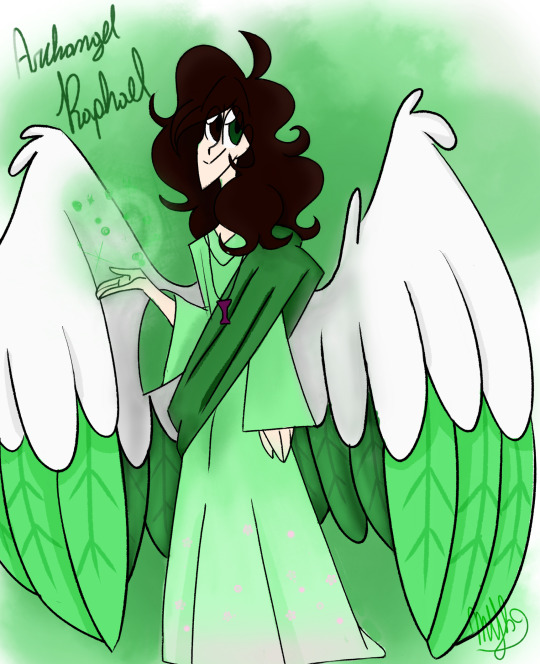
is the archangel rafael / raphael and it is not that the right color is the file not the shadow XD
Raphael (from Hebrew רָפָאֵל, transl. Rāp̄āʾēl, "God heals"; in Arabic: رافائيل; transl. Rāfāʾīl; Amharic: ሩፋዔል, transl. Rāfāʾīl), also known as Saint Raphael Archangel, is the name of an archangel common to Jewish religions , Christian and Islamic, responsible for performing all types of healing (physical, psychic or spiritual). Sent by God to heal in His Name, Raphael means "God heals" in Hebrew; the word corresponding to a doctor is Rophe.
The fact that Rafael is considered the bearer of Divine healing, provides evidence that he is responsible for the transition of the body and spirit.
udaic-christian
In the Bible, Archangel Raphael is quoted in the Old Testament, in the Book of Tobias (present only in the Catholic and Orthodox canon). In chapter 5, verse 4 (Tb 5,4) there is the beginning of the apparitions of Raphael to the young Tobias: "(…) Having left, he met the angel Raphael, without showing, however, to be an angel of God" .[1] In chapter 6, verse 3 (Tb 6,3), we see why the image sculpted by Catholics shows the archangel holding a fish. [2] Behold, the great fish that tried to devour Tobias and that the angel commanded him to dominate him to take the gall, which, it is indicated that is used by the archangel to heal Tobias' father by returning his sight. (Tb 6.11) [3]
In chapter 12, Rafael makes himself known, presenting himself as an angel (archangel) of God (Tb 12.15) "I am Rafael, one of the seven holy angels who assist and have access to the majesty of the Lord". [4]
He is not mentioned in the New Testament, but tradition identifies him as the angel who stirred the waters in John 5: 4. Rafael is also a prominent figure in the customs of Judaism. He is one of three angelics who visited Abraham before the physical devastation of Sodom and Gomorrah. [5]
His party is celebrated on September 29, along with that of Archangel Gabriel and that of Archangel Michael.
From 1921 to 1969 he had a party, "alone", on the General Roman Calendar on October 24th. However, his veneration is not limited to any particular day.
Islamic
Israfil is not named in the Qur'an (Koran) unlike Jibrail (Gabriel) and Mikail (Miguel). According to Hadith (الحديث), Israfil (Arabic Rafael) is the angel responsible for signaling the coming of the Last Judgment by blowing the horn (called Sûr) and sending the "Breath of Truth". The Sûr will be blown twice: the first will be the beginning of the Last Judgment; from the second, all souls will be called to trial and questioned. 👼✨💚
#raphael#archangel raphael#angel#my angel#angel raphael#anjo rafael#arcanjo rafael#drawing#my drawing#drawing cute#digital#my digital art#angel digital#art#oc art#my art#drawing angel#art angel
18 notes
·
View notes
Photo
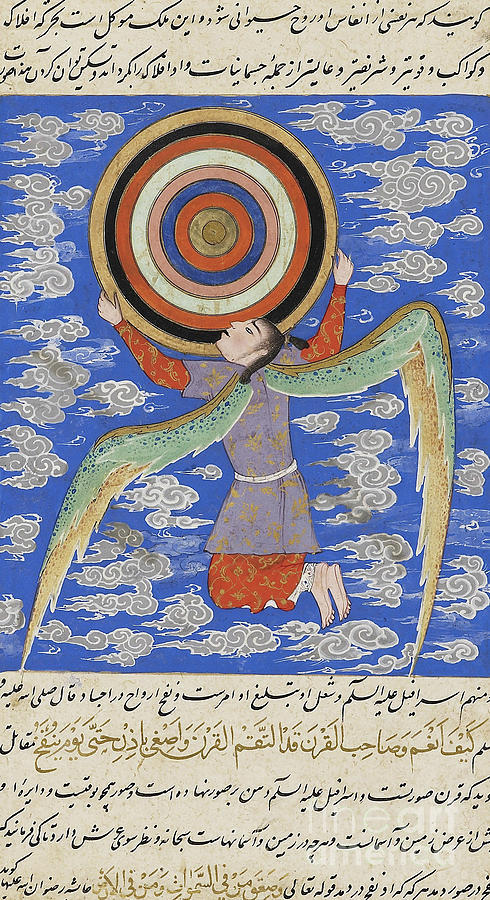
Belief in Angels is one of the six Articles of Faith in Islam. They are considered heavenly beings without their own will unlike humans who perform tasks of God. The imagination of angels in Islam developed from the Quran and was influenced by other religions like Judaism and expanded by tafsir (exegesis) and the hadith literature.
Angels take the role of intermediaries performing different tasks of God. They are (mostly) said to be created out of light. Unlike humans or jinn, they have no biological needs and therefore no lower desires predicted by the natural world. They may be described as creatures of pure emotion. It has been said that angels lack free will since they are known from the Quran to strictly obey what God commands; but different schools of Islam debate the extent of free will which angels have not as beings of endowed with human reason but as beings who may error, and if they are endowed with free will they are not subject to temptation. The implications of a well-known hadith concerning an argument that took place between the angels of Mercy and the angels of Punishment about what to do with a notorious murderer who repented of his crimes but died before reaching a pre-destination that would have ensured his forgiveness. This can be seen in Islamic scholarly analysis which suggests the decision-making framework of angels is different from that of mankind, as their souls are composed of light rather than mud-like clay. Additionally, angels are viewed as the original state of a soul, before it touches the earthly plane. Those who stay in heaven, remain as angels. Angels rank lower than humans, because they are, as already flawless and desire less beings, not capable to love God like humans do. Then humans die, they can return to the heavenly spheres with all deeds, experiences and thoughts accomplished on the earthen plane.
Some examples of angels in Islam:
1. Jibrail: the archangel Gabriel (Jibra'il or Jibril) is an archangel who serves as a messenger from God.
2. Michael (archangel): or Mikail, the angel of nature.
3.Israfil : is the angel of the trumpet in Islam,though unnamed in the Qur'an. Along with Mikhail, Jibrail and Izra'il, he is one of the four Islamic archangels. Israfil will blow the trumpet from a holy rock in Jerusalem to announce the Day of Resurrection. The trumpet is constantly poised at his lips, ready to be blown when God so orders.
4.Darda'il: the angels who travel in the earth searching out assemblies where people remember God's name.
5. Azrael is Azraa-ee or Izrail: the Angel of Death. No authentic reference of this in Quran or Hadeeth. Only referenced as angel of death.
6. Kiraman Katibin: the two angels who record a person's good and bad deeds.
7. Mu'aqqibat: a class of guardian angels who keep people from death until their decreed time.
8. Munkar and Nakir: the angels who test the faith of the dead in their graves. They ask the soul of the dead person questions. If the person fails the questions, the angels make the man suffer until the Day of Judgement. If the soul passes the questions, he will have a pleasant time in the grave until the Day of Judgement.
9. Ridwan: the angel in charge of maintaining Jannat or Paradise.
10. Maalik: the angel who keeps or guards hell fire
11. Harut and Marut are two angels mentioned in the second Surah of the Qur'an, who were sent down to test the people at Babel or Babylon by performing deeds of magic. (Sura Al-Baqara, verse 102.) The Qur'an indicates that although they warned the Babylonians not to imitate them or do as they were doing, some members of their audience failed to obey and became sorcerers, thus damning their own souls. (read more)
#islam#islamic angels#islamic arts#art history#art#do you guys enjoy history snippets? i'm trying to switch things up ❤︎
221 notes
·
View notes
Text
TAFSIR: Risale-i Nur: The Twenty-Eighth Letter - Part 5
Question: “Does Azra’il (UWP) himself take possession of them, or do his helpers do this?”
There are three “ways” in this matter:
The First Way: Azra’il (Upon whom be peace) takes possession of every dying person’s spirit. Nothing is an obstacle to another, for he is luminous. Something luminous can be present in innumerable places by means innumerable mirrors and appear in them. The similitudes of luminous beings possess their characteristics; they may be deemed the same as them and not other than them. The sun’s image in mirrors displays it’s light and heat. Similarly, the images of such spirit beings as the angels in the various mirrors of the World of Similitudes are the same as them; they display their characteristics. But they are represented in accordance with the capacities of the mirrors.
The same instant Gabriel (Upon whom be peace) appeared before the Companions in the form of Dihya, he appeared in different forms in thousands of places and was prostrating with his magnificent wings, which stretch from east to west, before the divine throne. His similitude was everywhere in accordance with the place’s capacity; at the same instant he was present in thousands of places.
According to this way, for the human and particular image of the Angel of Death represented in a human being’s mirror when he is taking possession of his spirit to receive the blow of a resolute, angry, awe-inspiring person like Moses (Upon whom be peace), and for that image-form, which resembled the Angel of Death’s clothes, to have his eye put out, would be neither impossible, nor extraordinary, nor irrational.
The Second Way: The archangels Gabriel, Michael, and Azra’il are like general supervisors. They have helpers that are similar to them in kind and resemble them, but are lesser than them. The assistants differ according to the sorts of creatures; those who take possession of the spirits of the righteous2 are of one sort, while those who take possession of the spirits of the wicked are of another,3 as the following verses point out:
By the [angels] who tear out [the souls of the wicked] with violence; * By those who gently draw out [the souls of the blessed].(79:1-2)
In view of this way, it is perfectly reasonable that, because he was naturally awe- inspiring and brave, and was an acceptable suppliant of God, Moses (Upon whom be peace) should have dealt a blow not at Azra’il (Upon whom be peace), but at the wraith-like body of one of his helpers.
The Third Way: As is explained in the Fourth Principle in the Twenty-Ninth Word and is indicated by some Hadiths, there are some angels who have forty thousand heads, and in each of their heads are forty thousand tongues, (which means that they also have eighty thousand eyes), and with each of those tongues they utter forty thousand divine glorifications. Yes, since the duties the angels are charged with are in accordance with the sorts of beings of the Manifest World, they represent those species’ glorifications in the Spirit World. It is certain to be thus, for the globe of the earth is a creature; it glorifies Almighty God. It has not forty thousand, but perhaps a hundred thousand sorts of beings, which are like heads. Each sort has hundreds of thousands of individual members which are like tongues; and so on. That means the angel appointed to the earth must have not forty thousand heads but hundreds of thousands; and in every head must be hundreds of thousands of tongues; and so on.
Thus, according to this way, Azra’il (Upon whom be peace) has a face and an eye that looks to each person. When Moses (Upon whom be peace) struck Azra’il (Upon whom be peace), it was not directed at his essential self and his true form, and it was not an insult, or non-acceptance; he struck, and strikes, in the eye the being who drew attention to his death and wanted to prevent his work, because he wanted his duties of prophethood to continue for ever.
God knows best what is right. * None knows the Unseen save God. * Say: The knowledge is with God alone.
He it is Who has sent down to you the Book: in it are verses basic or fundamental [of established meaning]; they are the foundation of the Book; others are allegorical. But those in whose hearts is perversity follow the part thereof that is allegorical, seeking discord, and searching for its hidden meanings, but no one knows its hidden meanings except God. And those who are firmly grounded in knowledge say: “We believe in the Book; the whole of it is from our Sustainer;” and none will grasp the Message except men of understanding.(3:7)
#allah#god#islam#muslim#revert#reverthelp#reverthelp team#convert#new revert#new convert#new muslim#muslim revert#muslim convert#welcome to islam#revert to islam#convert to islam#how to convert to islam#prophet#muhammad#quran#sunnah#hadith#Dua#prayer#salah#pray#help
1 note
·
View note